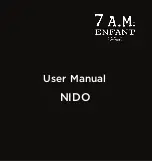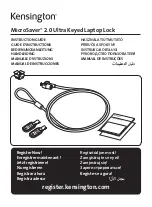FXTH870xD
Sensors
100
Freescale Semiconductor, Inc.
12.17
LFR Register Definition
The LFR module uses eight addresses in the MCU memory map for data, control, and status registers.This section consists of
register descriptions. Each control register (LFCTLx) should be modify when the LF is off (LFEN = 0). Modification of the control
registers “on-the-fly” might lead to unknown state. Each turn off of the LFR (LFEN = 0) should be followed by at least two LFO
cycles before trying to restart the LFR (LFEN = 1).
12.17.1 LF Control Register 1 (LFCTL1)
LFCTL1 contains the main LF enable control, detection protocol format controls, and input sensitivity controls. The LFCTL1
register also contains a register select bit, LPAGE.
$0020
Bit 7
6
5
4
3
2
1
Bit 0
R
LFEN
0
CARMOD
LPAGE
IDSEL[1:0]
SENS[1:0]
W
SRES
Reset:
0
0
0
0
0
0
0
0
Figure 75. LFR Control Register 1 (LFCTL1)
Table 59. LFCTL1 Register Field Descriptions
Field
Description
7
LFEN
LF Enable
— This read-write control bit is used to enable or disable the LF receiver. Once this bit is set the LFR will go through
a power-up sequence that starts on the next rising edge of the LFO clock. The first complete cycle of the LFO is used to power
up the LFR circuits. Following this startup time the auto-zero sequence is performed for 64
sec and then the LFR is ready to
receive signals.
0
LF receiver in standby.
1
LF receiver active.
Note:
Enabling the LF receiver function disables the GPIO Port B functions - see
.
6
SRES
Soft Reset
— This read/write bit controls the soft reset of the LFR. The bit is self reset and always reads as a logical zero.
0
Reset completed
1
Start a soft reset.
5
CARMOD
Carrier Mode
— This read/write control bit selects the basic operating mode for the LFR.
0
Data receive mode.
1
Carrier detect mode - wake the MCU when a carrier signal is detected if LFCDIE is set.
4
LPAGE
LFR Page Select
— This read/write bit is used is used to select the register page access. The LPAGE bit has no effect on the
LFCTL1 and LFCTL2 registers. This bit is cleared by LFR reset.
0
Access page 0.
1
Access page 1.
3:2
IDSEL[1:0]
Wakeup ID Selection
— Selects the existence and length of the wakeup ID. Reset clears these bits.
00
No ID expected
01
8-bit ID based on the contents of the LFIDL register
10
16-bit ID based on the contents of the LFIDH and LFIDL registers
11
8-bit ID matches the contents of either the LFIDH or LFIDL registers
1:0
SENS[1:0]
Sensitivity Control
— These two read/write control bits select the sensitivity thresholds for the LFR input. These thresholds
apply to the detection portion of a message. If the input level is below the S
NODET_x
level, no signal will be detected. If the level
is above S
DET_x
, the signal will be detected. Sensitivity settings are only used in the carrier detect path and do not affect reception
of the message body.
00
Performance not specified.
01
Low sensitivity (S
DET_L
; S
NODET_L
)
10
High sensitivity (S
DET_H
; S
NODET_H
)
11
Performance not specified.
Summary of Contents for FXTH870 D Series
Page 86: ...FXTH870xD Sensors 84 Freescale Semiconductor Inc Figure 57 Data Flow For Measurements...
Page 171: ...FXTH870xD Sensors Freescale Semiconductor Inc 169 Figure 128 QFN Case Outline...
Page 172: ...FXTH870xD Sensors 170 Freescale Semiconductor Inc Figure 129 QFN Case Outline...
Page 173: ...FXTH870xD Sensors Freescale Semiconductor Inc 171...

















